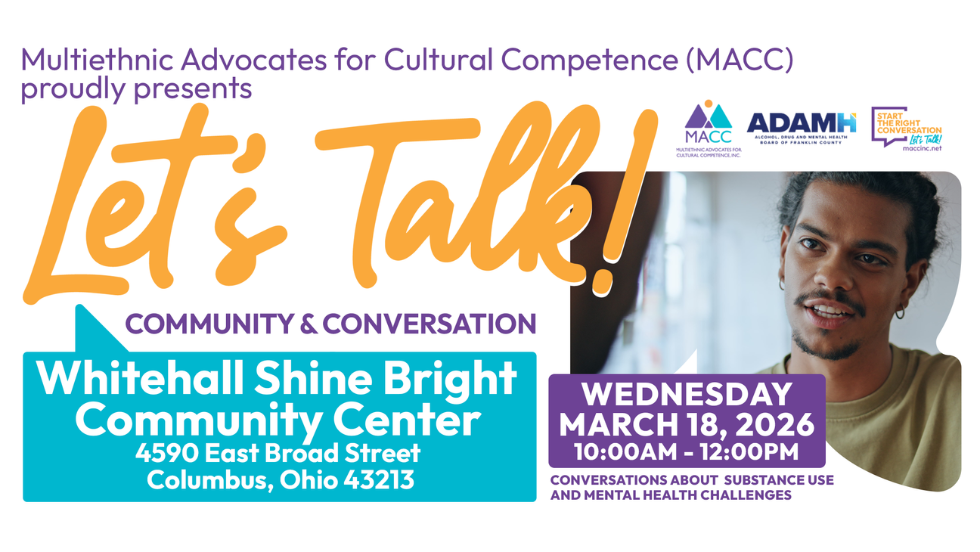Upcoming Trainings & Events
Events


Watch our event video to hear more!
Let’s Talk: Communities & Conversation
Building Stronger Communities Through Dialogue, Resources, and Real Connection
Meaningful conversations can change lives. This community-centered event brings together behavioral health professionals and community members to explore practical approaches to substance use, addiction, and mental health.
Whether you are a social worker, counselor, educator, faith leader, healthcare provider, or someone seeking guidance on how to support a loved one, this event is designed to equip you with tools you can use immediately.
Made possible with the support of Franklin County ADAMH, this gathering creates space for education, connection, and shared learning.
Why Attend?
Many professionals and families still struggle with:
-
How to start the conversation
-
What language to use
-
How to respond with compassion and clarity
-
Where to connect individuals and families for support
You will leave with practical strategies, referral knowledge, and greater confidence in navigating these conversations.
What to Expect
Panel Discussion
Hear from licensed counselors, community professionals, and a speaker with lived experience as they discuss recognizing signs, reducing stigma, and supporting families impacted by addiction and mental health challenges.
Brief Naloxone Demonstration
Learn how to administer Naloxone and increase your confidence in responding to an overdose emergency.
Audience Q&A
Engage in open, respectful dialogue.
Resource & Vendor Tables
Connect with local organizations offering treatment, recovery, crisis, and family support services.
Wellness Resource Bags & Light Refreshments
Take home practical materials to continue the conversation.
Who Should Attend?
-
Social workers
-
Counselors
-
Case managers
-
Healthcare and school professionals
-
Prevention specialists
-
Faith leaders
-
Community advocates
-
Family members seeking guidance
This event also launches MACC’s broader initiative, The Right Conversation, focused on strengthening how communities approach discussions around substance use and mental health.
Stronger communities begin with honest conversations.
Join us and be part of the dialogue that moves our community forward.
Trainings

Adult Mental Health First Aid
Part 2
February 25, 2026
9:00am -12:00pm
This session continues Adult Mental Health First Aid (MHFA) by focusing on how to respond when someone needs support. Participants practice using the MHFA Action Plan (ALGEE) as a clear framework to assess concerns, communicate supportively, and connect adults to appropriate professional help, self-help, and community resources—while emphasizing safety and privacy during the conversation.
2.5 CEUs awarded for Ohio registered CSWMFT.

Glow From Within: Redefining Beauty, Power, and Purpose Women's Workshop
March 5, 2026
10:00am -12:00pm
This trauma-informed workshop explores how cultural expectations, beauty standards, trauma, and social narratives can shape self-image and identity. Participants will engage in guided reflection, live polls, breakout conversations, journaling, and experiential exercises to build self-compassion and emotional resilience. Attendees will connect across perspectives, honor their stories, and leave with renewed clarity, confidence, and commitment to self-love.
2 CEUs awarded for Ohio registered CSWMFT.

Compassion Without Collapse: Preventing Burnout in Behavioral Health
March 17, 2026
1:00pm -3:00pm
This session is a practical, interactive training designed to help social workers, counselors, and helping professionals recognize early warning signs of burnout and secondary trauma while building sustainable habits for long-term practice. Participants will gain realistic, evidence-informed strategies to regulate stress, strengthen boundaries, and protect their well-being so they can continue serving others without sacrificing themselves.
2 CEUs awarded for Ohio registered CSWMFT.

Adolescents and Substance Use and Prevention: Trends and Reflections from Gateway Drugs to Overdoses
National Drug & Alcohol Facts Week
March 24, 2026
10:00am -12:00pm
This presentation follows the research, trends, and neuroscience of substance use in adolescents. From concerns about gateway drugs to the legalization of marijuana for recreational use, we will synthesize the historic concerns and current neurobiological research to better illustrate the threats, impacts, and opportunities related to substance use with our younger population.
2 CEUs awarded for Ohio registered CSWMFT.

Effective Communication & Connection: The C.A.R.E. Method
April 1, 2026
9:30am -12:30pm
This interactive training builds practical skills for clear, respectful, and effective communication. Using a human-centered framework grounded in curiosity, accountability, respect, and empathy, participants learn how to navigate challenging conversations, reduce misunderstandings, and strengthen trust across professional and community settings. The training emphasizes real-world application through discussion, reflection, and guided scenarios.
3 CEUs awarded for Ohio registered CSWMFT.

FASD 101: Fetal Alcohol Spectrum Disorder, The Basics
April 28, 2026
10:00am -12:00pm
Our current statistics indicate that 2-4% of youth are affected by FASD in the United States and UK, yet every study highlights how these numbers vastly underrepresent the prevalence of this disorder. This session will explore what we know understand about the causes, impact, and wide-spread effect of FASD on children, families, and broader society. From micro-level realities to system-wide impact, we will review the social, fiscal, and sociopolitical truths related to health equity and how to better understand this complex phenomenon. Includes toolkit.
2 CEUs awarded for Ohio registered CSWMFT.

Before the Crisis: Prevention that Actually Works
National Prevention Week
May 12, 2026
1:00pm -3:30pm
This training reframes prevention as an early, relational, and system-level practice rather than a reaction to crisis. Participants examine why prevention often occurs too late, how stress accumulates before behaviors escalate, and how timely support can improve outcomes without being permissive or punitive. Through guided reflection and applied discussion, the course supports a shift from reactive responses to practical, trauma-responsive, prevention-focused decision-making embedded in daily practice, relationships, and organizational culture.
2.5 CEUs awarded for Ohio registered CSWMFT.

Adult Mental Health First Aid
Part 1
June 16, 2026
9:00am -12:00pm
This session continues Adult Mental Health First Aid (MHFA) by focusing on how to respond when someone needs support. Participants practice using the MHFA Action Plan (ALGEE) as a clear framework to assess concerns, communicate supportively, and connect adults to appropriate professional help, self-help, and community resources—while emphasizing safety and privacy during the conversation.
**Both Part 1 and 2 required.
3.0 CEUs awarded for Ohio registered CSWMFT.

Adult Mental Health First Aid
Part 2
June 23, 2026
9:00am -12:00pm
This session continues Adult Mental Health First Aid (MHFA) by focusing on how to respond when someone needs support. Participants practice using the MHFA Action Plan (ALGEE) as a clear framework to assess concerns, communicate supportively, and connect adults to appropriate professional help, self-help, and community resources—while emphasizing safety and privacy during the conversation.
**Both Part 1 and 2 required.
2.5 CEUs awarded for Ohio registered CSWMFT.
